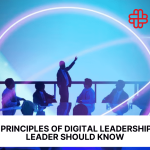Electrical engineering is a complex career path that requires a highly competent individual to successfully complete. The same applies to engineering organisations, yet their efficiency does not end with skilled workers. An organisation requires strong leaders to manage employees and ensure all tasks are being completed correctly and within a reasonable timescale.
Effective management is crucial for effective employees. A vast number of skills and techniques are necessary to conduct the job correctly. A leader needs to be level-headed, have a thorough understanding of the dynamics of their teams, and be capable of setting goals and motivating others to achieve them.
Not only does a leader need to support their employees, but they also have to guarantee that projects or tasks follow business values and industry standards. They need to maintain the balance between working efficiency, organizational needs, and employee needs. Alongside these responsibilities, leaders will need to provide coaching for poor performers, incentives for outstanding work, and intervention when possible conflict arises.
Upon completion of this course, participants will be able to:
- Understand the key traits of leadership.
- Encourage high performance in employees.
- Develop strong communication skills.
- Present innovative ideas with confidence and passion.
- Analyse different methods of coaching.
- Recognise a personal leadership style.
- Assess the ideal approach to dealing with conflict.
- Identify the advantages of effective leadership.
- Understand the ethical implications of leadership.
- Review the ideal styles of leadership within electrical engineering.
This course is designed for anyone within the electrical engineering industry who aspires to develop their leadership skills for their current position or potential future roles. It would be most beneficial for:
- Electrical Engineers
- Team Leaders
- Engineering Managers
- Project Managers
- Operations Managers
- Project Engineers
- Senior Electrical Engineers
- Engineering Directors
This course uses a variety of adult learning styles to aid full understanding and comprehension. Participants will review case studies of successful leaders within the industry to highlight what skills they possess and potential conflicts they may have faced.
They will be provided with the necessary tools to carry out learning exercises, during which they will review leadership skills and styles and analyse how these can influence success. They will also be provided with further examples of circumstances relating to conflict faced within the workplace, and in group discussions, they will assess how these issues would be addressed and resolved. These exercises will allow participants a full and comprehensive understanding of the taught content and allow them to gain more practical and relevant experience.
Day 5 of each course is reserved for a Q&A session, which may occur off-site. For 10-day courses, this also applies to day 10
Section 1: Introduction to Leadership
- The fundamentals of leadership.
- How to be a successful leader within an engineering organisation.
- Establishing your goals and objectives aligned with business values.
- The life cycle of an employee.
- The leadership framework.
Section 2: Understanding Effective Leaders
- Philosophies surrounding leadership.
- Identify successful leaders and their desirable skills.
- Assess personal leadership skills and which skills need to be developed.
- Analyse the advantages and disadvantages of different leadership styles.
- How an effective leader manifests dedicated employees.
- Keeping assignments, tasks, and projects on track despite internal and external influences.
Section 3: Leadership Skills in Engineering
- The importance of managing resources
- Establishing methods of motivation that exclude money.
- The essentials of high-performance management.
- Efficiently delegating tasks to those most suitable.
- Review techniques for coaching others.
- Finding the balance of firmness and empathy when coaching.
- Creating incentives and rewards to encourage outstanding work.
Section 4: Communication and Conflict
- The art of leadership and discipline.
- Identify how conflict may occur in the workplace.
- Addressing different circumstances of conflict with the most effective approach.
- How to navigate difficult employees.
- Utilising an empathetic voice to dissipate tension.
- Finding the right communication style for each team member.
- Using language to motivate others in times of stress and hardship.
Section 5: Developing Emotional Intelligence
- The core competencies of emotional intelligence.
- Assessing personal emotional intelligence.
- The ethical implications of poor leadership.
- How different leadership styles influence ethics.
- Producing personal action plans that highlight areas of personal improvement.
Upon successful completion of this training course, delegates will be awarded a Holistique Training Certificate of Completion. For those who attend and complete the online training course, a Holistique Training e-Certificate will be provided.
Holistique Training Certificates are accredited by the British Assessment Council (BAC) and The CPD Certification Service (CPD), and are certified under ISO 9001, ISO 21001, and ISO 29993 standards.
CPD credits for this course are granted by our Certificates and will be reflected on the Holistique Training Certificate of Completion. In accordance with the standards of The CPD Certification Service, one CPD credit is awarded per hour of course attendance. A maximum of 50 CPD credits can be claimed for any single course we currently offer.
- Course Code IND04-113
- Course Format Classroom, Online,
- Duration 5 days














